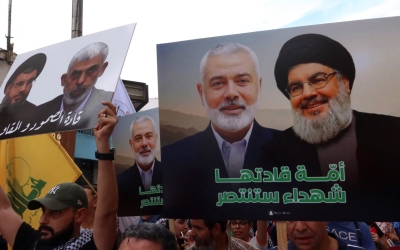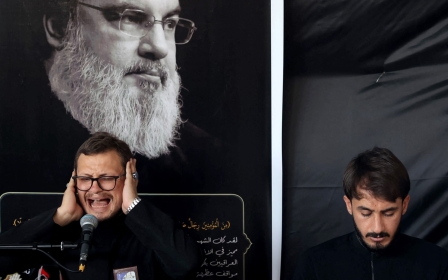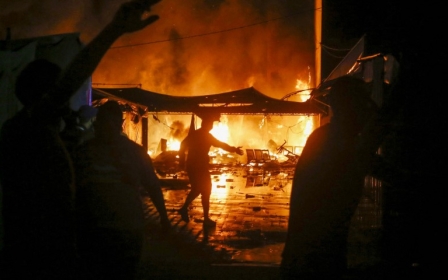US plans for a post-Hezbollah Lebanon are trying to revive a failed strategy

While Israel’s ground invasion of Lebanon falters, a war by other means is taking place behind the frontlines.
Diplomatic, political and media actors are mobilising to realign Lebanon away from supporting Palestinian resistance and in line with Israeli aims in Lebanon.
On 11 October, the US ambassador in Lebanon, Lisa Johnson, reportedly held a series of meetings with Lebanese politicians, including “independent” members of parliament. She reportedly told them to be ready for a new “post-Hezbollah era”, whereby the party’s alleged control of the state and border crossings would no longer hold.
Washington’s special envoy and former Israeli soldier and lobbyist, Amos Hochstein, is publicly appearing on major Lebanese networks and peddling the same story, but couched in diplomatic language. Lebanon’s Prime Minister Najib Mikati and the Council of Ministers have also affirmed commitment to United Nations Security Council resolution 1701 (aimed formally at ending hostilities between Hezbollah and Israel). Meanwhile, Israel has yet to announce its approval.
US officials, who were emboldened after Israel's pager attacks and the assassinations of top Hezbollah brass, including Secretary-General Hassan Nasrallah, are wagering on two trojan horses to turn the tables on Hezbollah from within.
New MEE newsletter: Jerusalem Dispatch
Sign up to get the latest insights and analysis on Israel-Palestine, alongside Turkey Unpacked and other MEE newsletters
The first is rushing the election of a new president whose agenda is in line with US and Israeli policies. A likely candidate is the head of the Lebanese army, Joseph Aoun. Choosing Aoun is tied to the second trojan horse of the US campaign against the resistance: a revamped version of resolution 1701.
Lebanon's 'territorial integrity'
The resolution’s extant version was issued in the aftermath of the 2006 Israeli war on Lebanon. It served as a reference point for disengagement.
Back then, it affirmed the “territorial integrity, sovereignty and political independence of Lebanon” as a means to undermine armed resistance led by Hezbollah in three steps.
The first is to bar any armed presence of Hezbollah south of the Litani river and endorses the call for disarming the group in line with UN resolution 1559 that was issued two years earlier. By contrast, no such restrictions were imposed on Israel.
The second is to deploy the Lebanese army across the south, and the third is to increase the size of UN troop presence to 15,000, while seeking to use them as the eyes and ears of western powers rather than protectors of the people of the south.
Hezbollah managed to circumvent these new restrictions with a two-pronged approach: avoid any visible armed presence south of the Litani; and coordinate with loyal factions in the Lebanese army to get an early warning of attempts by UN troops to expose any hideouts or activity.
Judging from the current war, Hezbollah’s strategy was relatively successful.
This is why Washington is currently betting on a revamped version of 1701 and stricter enforcement mechanisms that avoid the failures of the past. It has been encouraged by several developments since 2004.
Weak military and toothless UN
On the military front, the US struck a strategic partnership with the Lebanese army following the 2006 war. The partnership included financial aid amounting to $3bn. US ambassadors routinely meet with army chief Aoun and hold joint training or ceremonial events with high-ranking officers.
This policy was intended to create an ideologically pliant army. But thanks to Washington’s unshakeable commitment to Israel’s military superiority, none of this aid went towards the purchase of offensive weaponry or provided training to defend against foreign aggression rather than internal repression.
Washington’s Israel-first aid strategy means that the Lebanese army is incapable of defending south Lebanon from credible Israeli threats. During this war, Israel has attacked and killed Lebanese army soldiers with no response.
Deployment of Lebanese armed forces in the south will assist in securing Israel, not Lebanon. An unintended consequence is the army’s incapacity to overpower Hezbollah, to Washington’s detriment.
UN troops in Lebanon, known as Unifil, are equally toothless in the face of Israeli aggression. Since they were deployed after Israel’s 1978 invasion, these troops have failed to stop a single Israeli attack. In 1996, Israel shelled a UN compound in southern Lebanon sheltering displaced Lebanese, killing more than 100 and wounding hundreds more.
Since 2006, Unifil’s relative neutrality has seemingly been replaced with an overt bias towards Israel, despite the latter’s aggressive behaviour.
Israel attacked UN troops earlier this month under the pretext of their failure to implement 1701 and called for their redeployment a few kilometres north of the border.
On 17 October, a German warship operating under the Unifil flag shot down a drone heading from Lebanon to occupied Palestine. This foreshadows Hochstein’s reported demand to grant UN troops the authority to act as Israel’s proxy in tracking and attacking resistance forces.
Economic and social siege
Economically, Washington and its Gulf allies have increased financial and economic sanctions on Lebanon, denied it any relief following the 2019 financial collapse and chasing down the wealth of Shia expatriate communities in West Africa and Latin America to dry up any alleged communal funding of Hezbollah.
These measures were meant to fuel sectarian strife and incite the social base against Hezbollah.
In parallel, Washington fostered stronger links with emerging NGOs and newly-elected MPs to create a seemingly independent political elite that dissociated itself from the broken reputation of traditional forces while harbouring oppositional views to the resistance.
US machinations have made some impact, particularly in the realm of public opinion.
The domination of pro-western media outlets in Lebanon certainly helped in this regard. But Hezbollah and its chief ally, the Amal movement, have shored up their social base in the last parliamentary elections, held in 2022.
Despite these mediocre US results, Washington is now hoping that combining them with social destitution created by Israel’s killing, injuring, and displacement of hundreds of thousands of people will create sufficient conditions to paralyse Hezbollah.
But it is still evident that without a decisive - and so far elusive - military victory against Hezbollah, all these efforts are unlikely to bear fruit.
Trying to brutally eliminate the entire social base of Hezbollah by massacring civilians is not going to work either.
Increased attacks on the entire community will only strengthen the community’s resolve to defend the resistance forces defending them.
The views expressed in this article belong to the author and do not necessarily reflect the editorial policy of Middle East Eye.
Middle East Eye delivers independent and unrivalled coverage and analysis of the Middle East, North Africa and beyond. To learn more about republishing this content and the associated fees, please fill out this form. More about MEE can be found here.



